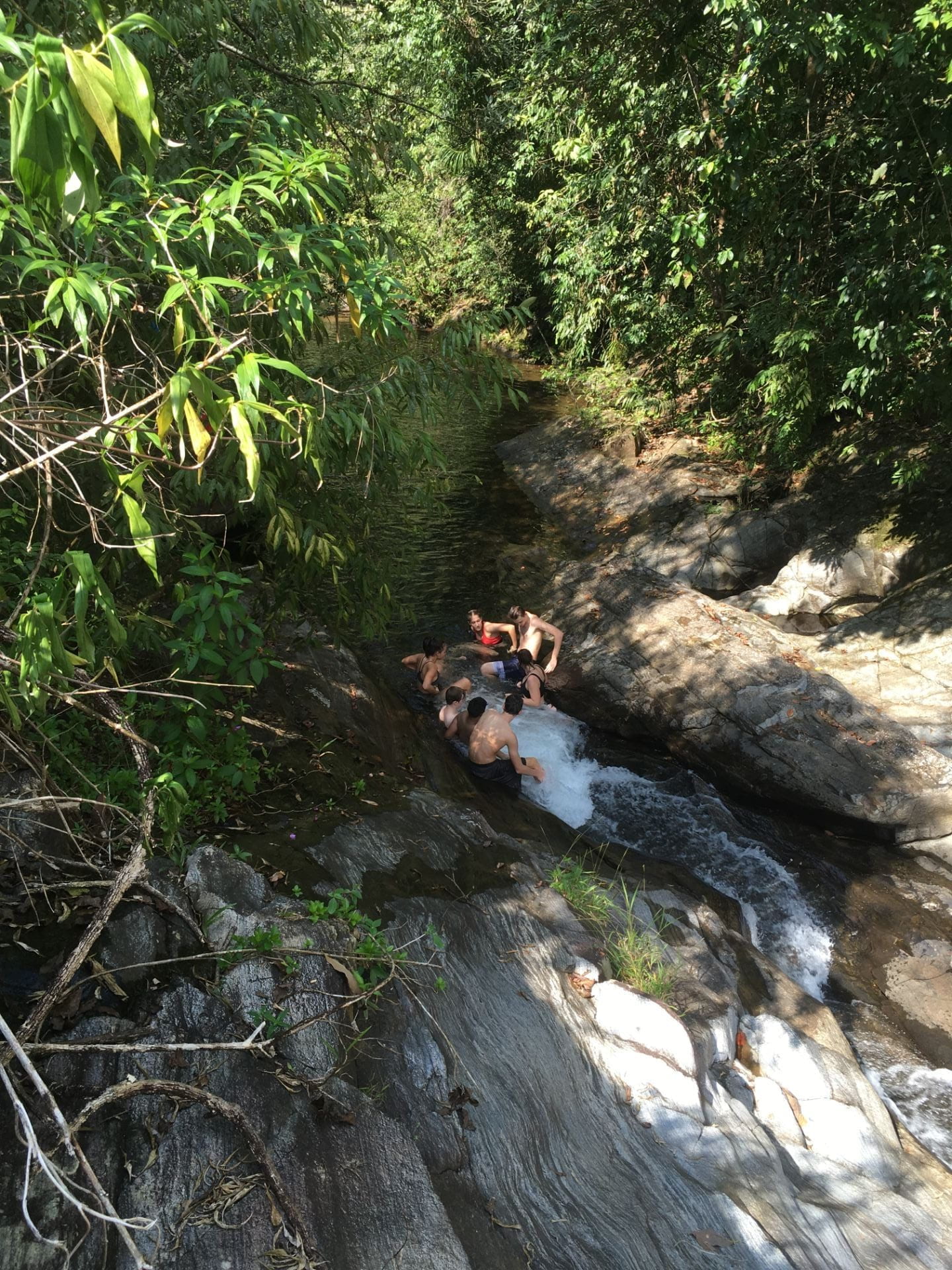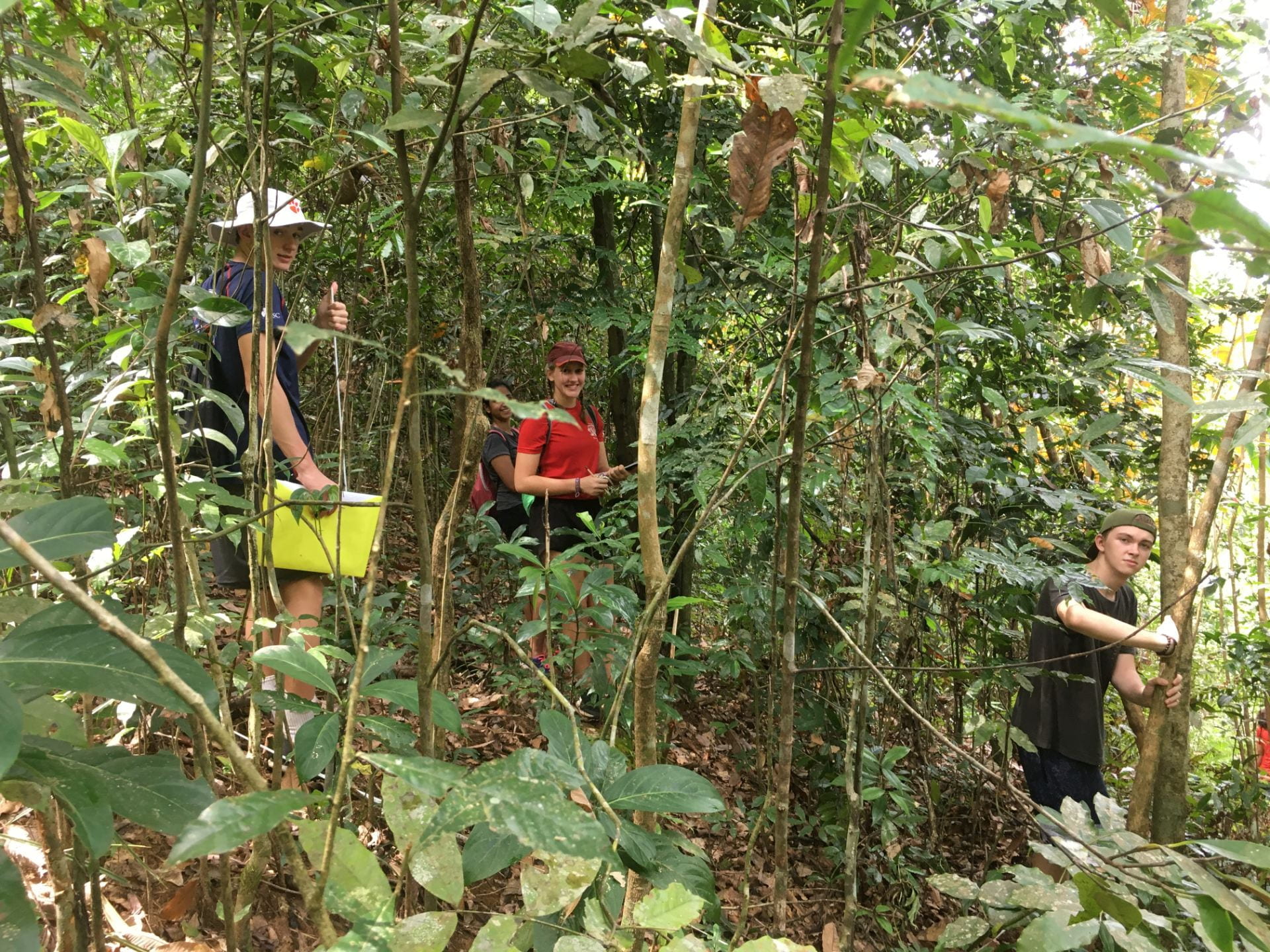Preparation
Before the journey itself, the grade 11 biology group immersed itself in a world of preparation and gained valuable knowledge regarding proper data collection and quadrat sampling techniques. We also learned how to calculate important indicators of biodiversity such as the SBI (Simpson’s Biodiversity Index) of an area. This prerequisite knowledge put me in a much better position to be successful on the journey and, by extension, in the future when using the data we gathered. Ultimately, the preparation we underwent before the journey was crucial to its success and I believe it was one of the primary reasons that the trip went so smoothly.
Journey
Day 1

Preparing to sample our first quadrats (Photo Credits: Anna Chandler)
The first day of our DP1 Biology trip was characterized by opportunities to learn and chances to build interpersonal relationships within our teams. The day began with our arrival at the Borderlands base camp, followed by a hearty breakfast. Immediately after this, we began to set up pitfall traps around the base camp. I believe that this activity was one of the most successful and enjoyable, and I appreciated the fact that it gave me an opportunity to better familiarize myself with the camp. Following this and the subsequent lunch, we set off on a hike into a local nature park where we would begin sampling quadrats. The hike itself was challenging due to the hot and humid conditions, but with the support from our group mates we all made it through. After sampling our first quadrat, we did a river study. This was a new experience for me and served as a great opportunity to learn a new skill. After the conclusion of the river study, we sampled our second quadrat and began the short but rainy hike back to camp.
Day 2

Enjoying a natural pool (Photo Credits: Anna Chandler)
Day 2 was once again full of surprises and chances to gain new experiences. The morning began with a 30-minute yoga session followed by a brief pitfall-trap check and a delicious breakfast. Immediately after breakfast a few of us took a dip in the river and we set off on the day’s adventure. The first quadrat sampling went as smoothly as possible, but the same could not be said for the second. Midway through (when we were recording our data), Matthew froze and quietly announced, “Jack, there’s a snake”. My initial reaction was one of amusement, as I had believed that he was joking, but a few moments later I turned around and lo and behold, there it was. We all immediately jumped away and ran back onto the main path. Later, upon learning that the snake was actually a venomous Russell’s Viper, we elected not to return to finish our work, and thus there is an absence of mention of “quadrat 4” in our notes. After the excitement died down,, we conducted a lichen study, swam in a river pool, and returned to base camp to reflect on the day. The main event was, however, the snake that had been 10 centimeters from my foot.
Day 3
The third day of the biology trip was uneventful when compared to the previous ones, but was interesting nonetheless. We began the day with a half-hour of meditation which I led (although I admit that some of my classmates used the time to nap) followed by breakfast and a bus ride to a nearby rubber plantation. There we began sampling quadrats and measuring biodiversity, after which we took some time to reflect on our journey through drawing, writing, or any other medium. Our journey concluded with a delicious lunch at borderlands and we arrived back in Colombo after our bus ride approximately three hours later.
Reflection
General Journey REflection
The journey allowed me to gain an incredible amount in terms of technical knowledge and my understanding of the natural world. It provided me with a chance to support my peers and build interpersonal relationships, and although I faced some challenges along the way (such as almost being attacked by a snake) I managed to overcome them and to ultimately enjoy the trip thoroughly. Moreover, as I mentioned previously, the data that my group and I collected over the three days put me in a much better position when constructing future reports regarding biodiversity in Sri Lanka. Ultimately, I deem the trip a great success and I believe that it was incredibly valuable as both an experience-gaining journey as well as a data-collecting journey.
Learning Outcomes
- Demonstrate that challenges have been undertaken, developing new skills in the process
- As I have said many times before, the DP1 biology trip was a great opportunity for me to develop new skills through the undertaking of new challenges. I had never previously done any of the different field tests which we completed and learning new data collection techniques as well as different metrics by which to analyze said data are just some examples of the plethora of skills that the trip allowed me to gain and develop.
- Demonstrate the skills and recognize the benefits of working collaboratively
- One of the foundations of the journey was collaboration. Our ability to work effectively with our group was one of the major facets that ensured the success of the trip and allowed the collection of data to be as effective and efficient as possible. Moreover, I was not only able to demonstrate my collaborative skills but also to demonstrate my understanding of the benefits of working collaboratively. Sampling the quadrats with my team allowed me to understand how much more difficult working alone would have been, and thus I was both able to demonstrate the skills and recognize the benefits of working collaboratively.
- Demonstrate engagement with issues of global significance
- Our time working in the field allowed us to understand the relative biodiversities of different areas, one of which was a rubber plantation. Sampling the plantation provided us with the opportunity to understand the negative effects of agriculture on the natural environment, and thus allowed me to demonstrate engagement with an issue of global significance.
